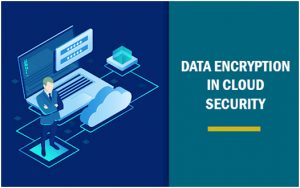Sensitive customer information and valuable intellectual property are stored in corporate data.
Information mishandling can result in fines, lawsuits, and huge damage. Data encryption is one type of protection that can help keep a company’s data safe from unauthorized access or cyber-attacks.

What Does Data Encryption Mean?
Data encryption is a security mechanism in which data is encoded and only a person with the correct encryption key can access or decrypt it. Encrypted data, often known as ciphertext, appears scrambled or unintelligible to someone without permission. There are two main types of data encryption available such as:
- Symmetric Encryption: Symmetric key algorithms encode and decode information using the same key. As a result, encryption is faster and more effective, and key generation and maintenance are easier. This is best for the one-on-one sharing of smaller data collections.
- Asymmetric Encryption: This type of encryption, often known as public-key cryptography, employs mathematically linked keys, including a public and private key. Data is encrypted using the public key, and it is decrypted using a separate parallel key.
What Kind Of Data Encryption is Available in Securing the Cloud?
From encrypted connections to limited encryption of sensitive data, cloud service providers provide a variety of encryption services. Data-in-transit and data-at-rest encryption are the most common types of data encryption utilized in the cloud.
- Data-in-transit: Web browsers and FTP client software that connects to secure websites, support this form of encryption natively. The HTTPS protocol is the most widely used cloud data-in-transit encryption.
- Data-at-rest: This type of cloud encryption is used when data is saved on a disc or other storage device. Key exchanges between the user and the device, handle the encoding and decoding of the data.
Few Encryption Algorithms
There are a variety of encryption methods available, we’ve listed the most common ones here.
- AES: The Advanced Encryption Standard (AES) is a well-known encryption technique that is utilized by the certified datacenters and other organizations. AES uses 192- and 256-bit keys for very demanding encryption needs, despite being incredibly efficient in 128-bit version. Except for brute force, AES is widely thought to be impregnable to all attacks. Usually, security experts suggests that AES should actual standard for encrypting data in the private sector.
- RSA: RSA is an asymmetric public-key encryption method that is used to encrypt information sent over the internet. As RSA encryption generates a large amount of complexity, it frustrates probable hackers, forcing them to spend a lot of time and energy trying to break into systems.
- Triple DES: Triple DES is much advanced over original Data Encryption Standard (DES), which was developed in response to DES’s vulnerability. Its symmetric encryption, which was previously the industry’s most extensively used symmetric technique, but is now being phased out. Triple DES encrypts passwords or PINs by repeating the DES algorithm three times on each data block.
How Can You Use Data Encryption Technology To Secure Cloud Data?
The security of your sensitive and essential information should be your company’s top priority as destructive cyber attacks have grown rapidly. As a result, implementing a few preventative actions in the area of data encryption can ensure that your cloud data is well-protected.
- Data Encryption Before Upload: This is one of the simplest but most important data encryption technologies. While HTTPS provides excellent data security to and from the cloud, it may not be sufficient for more stringent data security requirements. Users may want to encrypt (using AES or Triple DES) data before transferring it to the cloud in such instances.
- Cloud Cryptography Provides Secure Access: Another data encryption approach for securing your cloud computing data is cloud cryptography. Many cloud service providers, especially in the case of shared cloud services, include a layer of information protection that allows for safe access.
- Keep Your Data Safe With A Cloud Access Security Broker: Cloud Access Security Broker is on-premises software that is hosted in the cloud and functions as a middleman between businesses and their cloud providers. The CASB platforms also enable security teams to identify the danger of authorized cloud solutions, gain visibility into compliance risk, and improve threat detection capabilities.
- Cloud Service Provider’s Encryption: You can also entrust data encryption to your cloud service provider. Many cloud storage companies provide encryption services to protect your data while utilizing their services. This adds a layer of protection at the local level (data at rest) as well as during transit.There are numerous options for securing your cloud data. It may appear tough to figure out which strategy is ideal for you, but you can do so easily by mapping your cloud security requirements. Furthermore, maintaining a high level of data security awareness across your company can make the job a lot easier.
